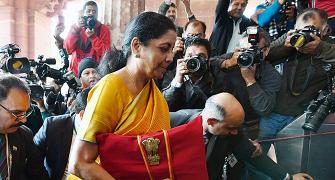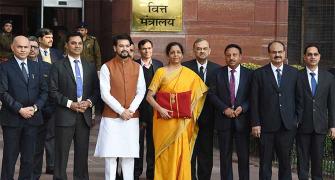The Budget emphasises on capacity building and empowerment of marginalised sections of society including farmers.

Union Finance Minister Nirmala Sitharaman on Saturday presented Union Budget for 2020-21, which proposes to give Indian economy an impetus to emerge as more vibrant and stronger.
With an emphasis on capacity building and empowerment of marginalised sections of society including farmers, the Union Budget intends to ensure, as said by Sitharaman, that "our people should be gainfully employed. Our businesses should be healthy. For all minorities, women and people from SCs and STs, this Budget aims to fulfil their aspirations."
Here are the key highlights:
Income Tax slabs:
Those earning up to Rs 5 lakh in a year will pay no tax.
Income between Rs 5-7.5 lakh, the tax rate is 10%.
Income between Rs 7.5-10 lakh, the tax rate is 15%.
Income between Rs 10-12.5 lakh, tax rate cut to 20% from 30%.
Income above Rs 15 lakh will continue to be taxed at 30%.
A person earning Rs 15 lakh per anum and not availing any deductions will now pay Rs 1.95 lakh tax in place of Rs 2.73 lakh.
The new personal income tax regime entails an estimated revenue foregone amounting to Rs 40,000 crore per year.
Entrepreneurship
Investment clearance cell to provide 'End-to-End' facilitation and support to entrepreneurial youth.
Developing five new smart cities in collaboration with states in PPP mode.
Encouraging manufacturer of mobile phones, electronic equipment and semiconductor packaging.
National technical textiles mission to position India as a global leader.
Government debt
The government's debt has reduced to 48.9 per cent from 52.2 per cent while presenting the Union Budget in the Lok Sabha.
With renewed vigour, under PM's leadership, we commit ourselves to present the people of India with all humility and dedication. People have reposed faith in our economic policy, said Sitharaman.
Goods and Service Tax
The new tax regime has resulted in efficiency gains in the transport and logistics sector.
Inspector Raj has vanished. It has benefitted MSME.
Consumers have got an annual benefit of Rs 1 lakh crore by GST.
Credit for farmers
The government to disburse Rs 15 lakh crore among farmers as credit for the year 2020-21.
Refinancing scheme of National Bank for Agriculture and Rural Development (NABARD) will be further expanded.
16-point plan for farm sector
These points include encouraging states to take up model agricultural laws, comprehensive measures for 100 water-stressed districts, PM Kusum Scheme, which removes dependence on kerosene and encourages the use of solar power, balanced use of fertilisers, an important step because currently the use of chemical fertilisers is incentivised.
A village storage scheme is proposed to be managed by SHEs. This will help farmers store more and reduce logistics costs.
Women in the village will be responsible for managing this seamless storage mechanism.
Krishi UDAAN scheme will be launched by the Aviation Ministry.
Horticulture sector with its current produce exceeds the production of food grains.
Financing of negotiable warehousing receipts will be integrating other e-services.
The government aims to eliminate the foot and mouth disease in sheep and goat by 2025.
The doubling of milk production of 53.5 million metric tonnes of milk to 103 metric million tonnes by 2025.
The government will involve youths in the fishery sector.
Rs 2.83 lakh crore outlay for agriculture and allied sector.
Rs 1.23 lakh crore for rural development and Panchayati Raj.
Industry, commerce and road
Rs 27,300 crore for the development of industry and commerce during 2020-21.
The government intends to turn every district into an export house.
Rs 8,000 crore over five years for quantum technologies and applications.
Delhi-Mumbai expressway and two other projects would be completed by 2023.
Monetisation of 12 lots of highway bundles of over 6,000km will be ensured before 2024.
Deposit insurance cover
Increase the insurance coverage of their bank deposits from Rs 1 lakh to Rs 5 lakh.
Deposit Insurance and Credit Guarantee Corporation has been permitted to increase deposit insurance coverage to Rs 5 lakh per depositor from Rs 1 lakh, says Sitharaman.
Tourism sector
Will get Rs 2,500 crore in 2020-21
Rs 3,150 crore proposed for Ministry of Culture
Indian Institute of Heritage and Conservation to be established
8 new museums proposed, 5 museums set for a major overhaul
5 iconic sites to see infrastructure development
Boost to infrastructure
100 more airports to be developed by 2024 to support UDAAN Scheme
Rs 22,000 crore for power and renewable energy sector
National Gas Grid to be expanded from the present 16200 km to 27000 km
103 lakh crore for national infrastructure pipeline: 22,000 crores via equity support to infrastructure finance companies
Reforms in banking sector
Deposit insurance coverage to be increased to Rs 5 lakh per depositor
Separate NPS trust for government employees
Proposal to sell a part of government holding in LIC by way of IPO
Invoice financing, subordinate debt, export support schemes
RBI to consider an extension of debt restructuring window for MSMEs till March 31, 2021
Limits for FPI in corporate bonds increased from 9% to 15% of the outstanding stock
Health sector
Rs 69,000 crore provided for health care in Union Budget 2020-21
Viability gap funding window proposed for setting up hospitals under Prime Minister Jan Arogya Yojana in PPP Mode
Jan Aushadhi Kendra Scheme to be expanded to all districts by 2024
Photograph: ANI Photo









